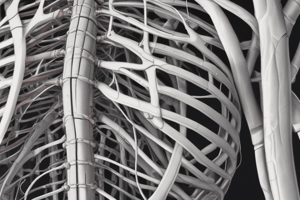Podcast
Questions and Answers
Experiencing intense fear, helplessness, or horror is not considered as an emotional sign of trauma.
Experiencing intense fear, helplessness, or horror is not considered as an emotional sign of trauma.
False (B)
Changes in sleep patterns, such as sleeping more or having trouble falling asleep, are not considered as behavioral signs of trauma.
Changes in sleep patterns, such as sleeping more or having trouble falling asleep, are not considered as behavioral signs of trauma.
False (B)
Physical signs of trauma can include memory problems, dizziness, or changes in vision.
Physical signs of trauma can include memory problems, dizziness, or changes in vision.
True (A)
Experiencing a heightened sense of vulnerability or helplessness is not considered as a psychological sign of trauma.
Experiencing a heightened sense of vulnerability or helplessness is not considered as a psychological sign of trauma.
Feeling overwhelmed, helpless, or horrified is not considered as an emotional sign of trauma.
Feeling overwhelmed, helpless, or horrified is not considered as an emotional sign of trauma.
Engaging in self-destructive behaviors, such as substance use or excessive exercise, is not considered as a behavioral sign of trauma.
Engaging in self-destructive behaviors, such as substance use or excessive exercise, is not considered as a behavioral sign of trauma.
Feeling numb, disconnected, or unable to trust others is not considered as a psychological sign of trauma.
Feeling numb, disconnected, or unable to trust others is not considered as a psychological sign of trauma.
Headaches are not considered as physical signs of trauma.
Headaches are not considered as physical signs of trauma.
Being unable to concentrate, feeling sad, or having trouble sleeping are not considered as emotional signs of trauma.
Being unable to concentrate, feeling sad, or having trouble sleeping are not considered as emotional signs of trauma.
Changes in appetite or eating habits are not considered as physical signs of trauma.
Changes in appetite or eating habits are not considered as physical signs of trauma.
Flashcards are hidden until you start studying
Study Notes
How to Know If You Are a Victim of Trauma
Trauma is an emotional response to a distressing or threatening event, and it can manifest in various ways, both emotionally and physically. If you suspect you may be a victim of trauma, it's essential to understand the signs and seek help when necessary. In this article, we will discuss the emotional, behavioral, physical, and psychological signs of trauma.
Emotional Signs of Trauma
Emotional signs of trauma can include:
- Feeling overwhelmed, helpless, or horrified
- Experiencing intense fear, helplessness, or horror
- Being unable to concentrate, feeling sad, or having trouble sleeping
- Feeling shocked, denied, angry, fearful, sad, shameful, confused, anxious, depressed, numb, guilty, or hopeless
Behavioral Signs of Trauma
Behavioral signs of trauma may include:
- Changes in sleep patterns, such as sleeping more or having trouble falling asleep
- Eating more or less than usual
- Engaging in self-destructive behaviors, such as substance use or excessive exercise
- Feeling irritable, withdrawn, or emotionally distant
- Experiencing flashbacks, nightmares, or intrusive thoughts about the traumatic event
Physical Signs of Trauma
Physical signs of trauma can include:
- Headaches
- Aches and pains around the body
- Shaking, tremors, or muscle tension
- Fatigue
- Sweating
- Changes in appetite or eating habits
- Memory problems, dizziness, or changes in vision
Psychological Signs of Trauma
Psychological signs of trauma may include:
- Feeling numb, disconnected, or unable to trust others
- Experiencing a heightened sense of vulnerability or helplessness
- Having difficulty processing experiences or emotions related to the trauma
- Displaying symptoms of post-traumatic stress, such as increased anxiety, depression, or flashbacks
It's essential to be aware that trauma affects everyone differently, and you might experience a combination of these signs or have reactions not mentioned here. If you suspect you are a victim of trauma, it's crucial to seek professional help to process your experiences and develop coping strategies. Treatment can help you find ways to manage your symptoms and regain a sense of emotional balance. Remember, there is no "right" or "wrong" way to think, feel, or respond to trauma, and it's essential to be patient with yourself as you heal and recover.
Studying That Suits You
Use AI to generate personalized quizzes and flashcards to suit your learning preferences.




